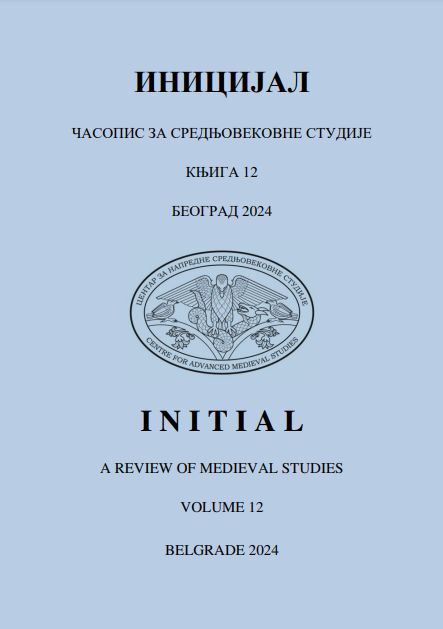Херакле и Хидра: поводом једне схолије у српскословенском преводу „Аподиктичких слова“ Григорија Паламе
Heracles And Hydra: On the Occasion of One Scholium in the Serbian Church-Slavonic Translation of “Apodictic Treatises” of Gregory Palamas
Author(s): Mikonja KneževićSubject(s): Cultural history, Middle Ages
Published by: Центар за напредне средњовековне студије
Keywords: Serbian Church-Slavonic translation; scholia; polemics, Gregory Palamas; Heracles; Holy Fathers; Plato; Socrates; sophistic; eristic; heresy
Summary/Abstract: The Serbian Church-Slavonic translation of Gregory Palamas’ “Apodictic Treatises on the Procession of the Holy Spirit” contains a large number of scholia. Through them, the translator sought to clarify complex theological issues, primarily related to the filioque problem, but at the same time pointed out the presence of an ancient heritage in the main text. In addition - to expertly deciphering the various argumentation techniques that Palamas resorts to, which are mostly based on Aristotle’s postulates, the Serbian translator also reveals the meaning of certain ancient mythologemes or maxims that appear in this theological treatise. In one of the scholia, he connects Palamas’s incidental mention of the “hydra” with the ancient myth about the second of Heracles’ labors, which the ancient hero performed at the request of the Mycenaean king Eurystheus. Heracles’ presence in Christian literature was marked by a visible du- ality: from principled rejection to a kind of (allegorical) appropriation. Pro- dicus’ portrayal of Heracles, preserved in Xenophon’s Memorabilia, in which the ancient hero is depicted as one who chooses the path of virtue over vice, allowed Christian writers to adapt his character, primarily as an allegorical representation of perfection – through παιδεία and ἄσκησις – in virtue. This was the case with the incidental observations of Clement of Ale- xandria and Gregory the Theologian, and especially with Basil the Great’s famous Oratio ad adolescentes. In addition to this ethical contextualization, Heracles’ fight with the hydra was interpreted in a polemical key in ancient and Christian times. In Plato’s dialogue Euthydemus, the hydra is understood as σοφιστρία and metaphorically depicts the manipulative sophistic practice of constantly presenting (false) arguments, after the “heads” of the previous ones have been cut off by Socrates/Heracles. The mythical narrative in question here is understood as the struggle of “sophism” or “eristics” with the Socratic ἔλεγχος: while the former is preoccupied with winning over an audience, the latter’s goal is to arrive at the truth and acquire virtue. The comparison of Socrates with Heracles is also evident in Plato’s Apologia Socratis, while the fight with the hydra appears in a similar polemical key in the dialogue Phaedo. In the writings of Gregory Palamas, the hydra is used metaphorically to denote teachings that oppose official Church dogma. In the Tractatus apo- dicticus, the teachings of Arius, Apollinaris, Macedonius, Eunomius, and “many others” are designated as the heads of the hydra, to which the Latin teaching on the procession of the Holy Spirit from the Son is later added. Pa- lamas afterwards used the same metaphor in his polemic with Gregory Akindynos, and – along with the mention of Proteus and the sophists, just as Plato did in his dialogues – he also used it in his Vita S. Petri Athonitae, this time in the context of spiritual experience. By skillfully deciphering Palamas’s incidental mention of the “hydra” in the text of Tractatus apodicticus and by linking it with Heracles’ second labor, the Serbian translator in his scholia reveals – albeit in an extremely reduced form – some of the directions in which the reception of this my- thologem moved in later Ancient and Christian literature.
Journal: Иницијал. Часопис за средњовековне студије
- Issue Year: 2024
- Issue No: 12
- Page Range: 139-163
- Page Count: 25
- Language: Serbian

